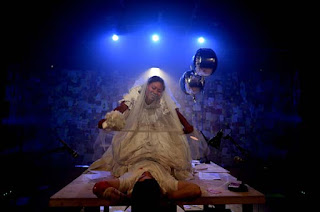Marlowe's play may be enduringly popular, but I do find it can be uneven and episodic, and can require a lot of tightening up to make it flow. Or, like director Ricky Dukes, you can instead lean into its disjointed nature and largely unconnected setpieces.
Dukes is an enthusiastic graduate of the Yaël Farber School of Making Actors Traverse the Stage in Extreme Slow Motion (it takes one actor four minutes to cross the tiny stage before the dialogue even starts) but apart from those moments he's back to throwing every possible idea and twist at the play and seeing what sticks. Not all of them do, making for a hugely uneven evening, but there's no denying that much of it is surreally entertaining, in a production that for much of the middle section reconceives Marlowe's epic tragedy as a twisted black comedy.
I can't quite make my mind up about how well the character progression is served: O'Neill's Faustus is introduced as supremely arrogant and self-satisfied, shamelessly flirting with the audience* and cockily challenging Mephistopheles' warnings about what he's selling himself into. It's a trait that follows him into the later stages of the play as Faustus becomes less the scholar, more the court magician entertaining the heads of Europe, but along the way this alternates rather abruptly with his moments of doubt. His smugness fits well with the way his grand plans of knowing the depths of the universe quickly turn into him becoming a glorified court entertainer, but I would have liked more suggestion of how his overconfidence in his own indestructability is what ultimately doomed him.
Meanwhile Mephistopheles is a far cry from Marlowe's depressed demon, more like a Jackass Genie whose granting of Faustus' wishes has a tendency to come with a grotesque twist (Angland's resemblance to Jimmy Carr is hardly going to subvert this sense of evil mischief.) I think the lines where Faustus wonders whether the 24 years of wonders ever happened or whether they were just an illusion are missing from this heavily edited version, but the idea is still planted: The ensemble of demons who serve Mephistopheles are marked by a smear of green makeup over their mouths, and they keep this even when playing Emperors, Popes and historical figures, suggesting this may all just be a puppet show to convince Faustus he's getting what he paid for.
Designer Sorcha Corcoran is definitely one of the production's MVPs, with a design that takes obvious inspiration from a number of disparate sources, often cinematic: There's a serial killer movie aesthetic to a lot of the gore, with a back wall that nods at Se7en in particular; Mephistopheles and the demons' office wear lends an American Psycho touch, while the office equipment littering the stage hints at the banality of what Faustus has ultimately achieved; and the scene at the Vatican nods at Beetlejuice as the cardinals get forced into the hokey cokey by unseen forces. There's also, courtesy of Charis Murray's Pope, a volume of "feck"s to beat even the production that had the actual Mrs Doyle in it. Despite all the sex and violence this might be the scene that most pushes the envelope, showing a level of respect to Catholics that's probably best described as... in keeping with Marlowe's sentiments.
Doctor Faustus by Christopher Marlowe is booking until the 1st of October at Southwark Playhouse's Little Theatre.
Running time: 1 hour 40 minutes straight through.
Photo credit: Charles Flint.
*and if he doesn't win Best Nipples this year it's only 'cause the production photography hasn't provided a suitable illustration






No comments:
Post a Comment